List of municipalities in Sullivan County, Pennsylvania
Sullivan County, Pennsylvania, United States, is divided into 13 incorporated municipalities. State law defines the two kinds of municipalities present in the county: four boroughs and nine townships. In the 2010 census, the population of Sullivan County was 6,428,[1] making it an "Eighth Class County", defined by Pennsylvania law as "having a population of less than 20,000 inhabitants".[2] Its county seat is Laporte, which was the smallest county seat in Pennsylvania by population, as of 2001.[3]
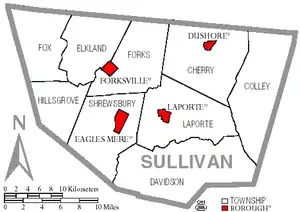
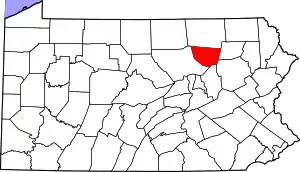
Sullivan County is located in north central Pennsylvania, about 123 miles (198 km) northwest of Philadelphia and 195 miles (314 km) east-northeast of Pittsburgh.[4] The county covers 452 square miles (1,170 km2), of which 450 square miles (1,165 km2) is land and 2 square miles (5.2 km2) (0.53%) is water. Its municipalities range in size from the borough of Dushore with 0.9 square miles (2.3 km2) to Davidson Township with 78.2 square miles (203 km2). Cherry Township has the highest population of any municipality (1,705 or 26.5% of the county total as of 2010), while the borough of Eagles Mere has the lowest population (120 or 1.9%).[1]
Although Sullivan County has boroughs and townships, it has no cities. Any municipality in Pennsylvania with more than 10 persons can incorporate as a borough. Any township or borough with a population of at least 10,000 can ask the state legislature to become chartered as a city. However, as Sullivan County has a population of only 6,428, it has no cities. There are no unincorporated areas in the county, since all territory in Pennsylvania is incorporated.[2]
History
The land which became Sullivan County was purchased from the Iroquois by the Province of Pennsylvania in 1768, as part of the first Treaty of Fort Stanwix. It was part of Northumberland County, then became part of Lycoming County when it was formed in 1795.[5] Sullivan County itself was formed from the northeastern part of Lycoming County on March 15, 1847. It was the thirteenth and last county formed at least partly from Lycoming County, and the fifth entirely formed from it.[5]
According to the official state publication The Pennsylvania Manual (2011), Sullivan County was named for Pennsylvania state senator Charles C. Sullivan, who "took an active part in procuring passage of the bill" establishing the county.[2] However, according to former Pennsylvania state librarian Frederic A. Godcharles (1933) and oliver P. Williams' County Courthouses of Pennsylvania: A Guide (2001), the county is named for General John Sullivan, who led the Sullivan Expedition against the Iroquois in 1779.[3][6]
While all four boroughs were formed after Sullivan County was established, seven of the nine townships were formed while still part of Lycoming County. The first of these was Shrewsbury Township, which encompassed all of modern Sullivan County when it was formed in 1803. Elkland Township was formed from Shrewsbury in 1804, as were Cherry (1824), Davidson (1833), and Forks Townships (1833). Plunketts Creek Township was formed from Franklin and Davidson Townships in 1838, and Fox Township was formed from Elkland in 1839. When Sullivan County was formed in 1847, both Shrewsbury and Plunketts Creek Townships were split, with each county having a township of that name. Plunketts Creek Township in Sullivan County changed its name to Hillsgrove Township in 1856.[7] Sullivan County has no former townships, and no counties have been formed from it.
When formed in 1847, Sullivan County had no boroughs. The unincorporated village of Cherry Hill in Cherry Township served as the first county seat until 1850, when Laporte was founded in the geographic center of the county, and became its new county seat.[6] In 1850 the population of the county was 3,694 and it grew steadily to a peak of 12,134 in 1900. This was just after the borough of Eagles Mere was incorporated as the last of the county's municipalities, in 1899.[8] Much of this growth was fueled by lumber-based industry, but the virgin forests were almost all gone by 1900 and the population declined in eight of eleven decades since then, decreasing by a total of 47% between 1900 and 2010.[7][9]
Municipalities
| Municipality (type) |
Remarks[5][7] | Settled | Incorporated[10] | Formed from | Area | Population (2010)[1] | Map | Photo |
|---|---|---|---|---|---|---|---|---|
| Dushore (borough) | Named for Aristide Aubert Du Petit Thouars, a French settler who built the first cabin. Dushore is a corruption of "Du Petit Thouars". | 1794[7] | 1859 | Cherry Township[7] | 0.9 sq mi (2.3 km²) | 608 |  |  |
| Eagles Mere (borough) | Named for "Eagles Mere Lake" in its center, which was itself named for bald eagles and "mere", a term for a broad and shallow lake. | 1877[10] | 1899 | Shrewsbury Township[10] | 2.2 sq mi (5.8 km²) | 120 |  |  |
| Forksville (borough) | Named for the confluence ("forks") of Little Loyalsock Creek with Loyalsock Creek in the borough. | 1794[7] | 1880 | Forks Township[10] | 1.5 sq mi (3.9 km²) | 145 |  |  |
| Laporte (borough) | County seat; named for John Laporte, member of the U.S. House of Representatives and last surveyor general of Pennsylvania. | 1850[6][10] | 1853 | Laporte Township[7] | 1.3 sq mi (3.3 km²) | 316 |  | 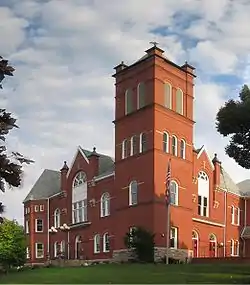 |
| Cherry Township | Named for stands of old growth cherry trees or the village of Cherry Hill. | 1816[6][10] | 1824 | Shrewsbury Township, while part of Lycoming County[6][10] | 57.8 sq mi (149.8 km²) | 1,705 | 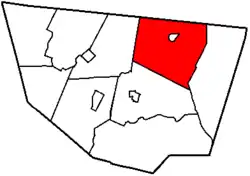 | 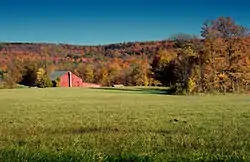 |
| Colley Township | Named for William Colley, local businessman and judge. | 1823[10] | 1849 | Cherry Township[6][10] | 59.0 sq mi (152.8 km²) | 694 |  |  |
| Davidson Township | Named for Asher Davidson, an associate judge of Lycoming County. | 1806[6][10] | 1833 | Shrewsbury Township, while part of Lycoming County[7] | 78.2 sq mi (202.5 km²) | 573 |  | 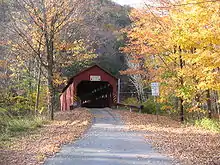 |
| Elkland Township | Named for the elk that once lived in the area. | 1798[6][10] | 1804 | Shrewsbury Township, while part of Lycoming County[7] | 38.7 sq mi (100.2 km²) | 577 |  |  |
| Forks Township | Named for the confluence ("forks") of Little Loyalsock Creek with Loyalsock Creek, now in Forksville. | 1794[10] | 1833 | Shrewsbury Township, while part of Lycoming County[7] | 43.9 sq mi (113.7 km²) | 377 | 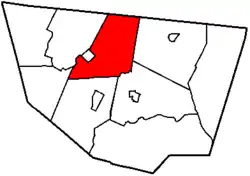 |  |
| Fox Township | Named for George Fox, the founder of the Religious Society of Friends. | 1800[6][10] | 1839 | Elkland Township, while part of Lycoming County[7] | 38.6 sq mi (100.0 km²) | 358 |  |  |
| Hillsgrove Township | Named for John Hill, a prominent early settler, and the village of Hillsgrove he founded as Plunketts Creek Township The name was changed in 1856.[7] | 1786[6][10] | 1838[11] | Davidson and Franklin Townships, while part of Lycoming County[11] | 28.4 sq mi (73.6 km²) | 287 | 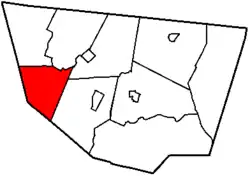 |  |
| Laporte Township | Named for John LaPorte, member of the U.S. House of Representatives and last surveyor general of Pennsylvania. | 1830[10] | 1850 | Cherry, Davidson and Shrewsbury Townships[6][10] | 53.7 sq mi (139.2 km²) | 349 |  |  |
| Shrewsbury Township | Named for Shrewsbury Township, New Jersey. | 1799[10] | 1803 | Muncy Township, while part of Lycoming County[11] | 48.1 sq mi (124.5 km²) | 319 |  |  |
Clickable map
The map shown below is clickable; click on any municipality name to be redirected to the article for that borough or township.
References
Unless otherwise noted, all information on area and population comes from the U.S. Census Bureau.
- "U.S. Census website". United States Census Bureau. Retrieved 2012-06-15.
- Trostle, Sharon, ed. (2011). "Chapter 6: Pennsylvania Local Government" (PDF). The Pennsylvania Manual. Commonwealth of Pennsylvania. pp. 6–9, 6–40. Archived from the original (PDF) on 2014-01-16. Retrieved 2012-06-15.
- Williams, Oliver P. (2001). County Courthouses of Pennsylvania: A Guide. Stackpole Books. pp. 193–195. ISBN 0-8117-2738-6. Retrieved 2012-06-15.
- Michels, Chris (1997). "Latitude/Longitude Distance Calculation". Northern Arizona University. Retrieved 2012-06-15.
- Meginness, John Franklin (1892). History of Lycoming County, Pennsylvania: including its aboriginal history; the colonial and revolutionary periods; early settlement and subsequent growth; organization and civil administration; the legal and medical professions; internal improvement; past and present history of Williamsport; manufacturing and lumber interests; religious, educational, and social development; geology and agriculture; military record; sketches of boroughs, townships, and villages; portraits and biographies of pioneers and representative citizens, etc. etc (1st ed.). Chicago, IL: brown, Runk & Co. ISBN 0-7884-0428-8. Retrieved 2012-06-15.
(Note: ISBN refers to Heritage Books July 1996 reprint. URL is to a scan of the 1892 version with some OCR typos).
- Godcharles, Frederic A. (1933). Pennsylvania: Political, Governmental, Military and Civil: Political and Civil History Volume (First ed.). New York, New York: The American Historical Society.
- Thomas J. Ingham (1899). History of Sullivan County, Pennsylvania: Compendium of Biography. Chicago, Illinois: Lewis Publishing Co. OCLC 35904783. Retrieved 2012-06-15.
- "Historical Census Browser: Pennsylvania: Pennsylvania: Total Population by County 1850-1960". University of Virginia Library. Archived from the original (Searchable database) on 2007-07-15. Retrieved 2012-06-15.
- Richard L. Forstall (March 27, 1995). "Pennsylvania, Population of Counties by Decennial Census: 1900 to 1990". U.S. Census Bureau. Retrieved 2012-06-15.
- "Sullivan County 7th class" (PDF). Pennsylvania Historical and Museum Commission. Retrieved 2012-06-15.
- "Lycoming County 5th class" (PDF). Pennsylvania Historical and Museum Commission. Retrieved 2012-06-15.
External links
- "Sullivan County, Pennsylvania". Sullivan County Commissioners. Retrieved 2012-06-15. Official Sullivan County Website
- 2011 General Highway Map Sullivan County Pennsylvania (PDF) (Map). 1:65,000. Pennsylvania Department of Transportation, Bureau of Planning and Research, Geographic Information Division. Archived from the original (PDF) on 2014-06-02. Retrieved 2012-06-15.




